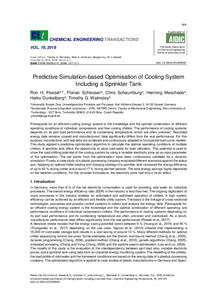Date
2018Author
Peesel, Ron-HendrikSchlosser, FlorianSchaumburg, ChrisMeschede, HenningDunkelberg, HeikoWalmsley, Timothy GordonMetadata
Show full item record
Aufsatz

Predictive Simulation-based Optimisation of Cooling System Including a Sprinkler Tank
Abstract
Prerequisite for an efficient cooling energy system is the knowledge and the optimal combination of different operating conditions of individual compression and free cooling chillers. The performance of cooling systems depends on its part load performance and its condensing temperature, which are often unknown. Recorded energy data remains unused and manufacturers' data significantly differs from the real performance. For this purpose, manufacturer and real data are combined and continuously adapted to form partial load curve models.
This study applied a predictive optimization algorithm to calculate the optimal operating conditions of multiple chillers. A sprinkler tank offers the opportunity to store cold-water for later utilisation. This potential is used to show the load shifting potential of the cooling system by using a variable electricity price as an input paramete of the optimisation. The set points from the optimisation have been continuously validated by a dynamic simulation. Finally, a case study of a plastic processing company evaluated different scenarios against the status quo. Applying an optimal chiller loading and charging strategy of a sprinkler tank increased the energy efficiency of up to 40 % during colder and around 17% during warmer periods. The total energy savings highly depended on the weather conditions. For the consider fluctuations, the electricity price had only a minor effect.
This study applied a predictive optimization algorithm to calculate the optimal operating conditions of multiple chillers. A sprinkler tank offers the opportunity to store cold-water for later utilisation. This potential is used to show the load shifting potential of the cooling system by using a variable electricity price as an input paramete of the optimisation. The set points from the optimisation have been continuously validated by a dynamic simulation. Finally, a case study of a plastic processing company evaluated different scenarios against the status quo. Applying an optimal chiller loading and charging strategy of a sprinkler tank increased the energy efficiency of up to 40 % during colder and around 17% during warmer periods. The total energy savings highly depended on the weather conditions. For the consider fluctuations, the electricity price had only a minor effect.
Citation
In: Chemical engineering transactions (CEt) Volume 70 (2018) , S. 349-354 ; EISSN 2283-9216Citation
@article{doi:10.17170/kobra-202012092470,
author={Peesel, Ron-Hendrik and Schlosser, Florian and Schaumburg, Chris and Meschede, Henning and Dunkelberg, Heiko and Walmsley, Timothy Gordon},
title={Predictive Simulation-based Optimisation of Cooling System Including a Sprinkler Tank},
journal={Chemical engineering transactions (CEt)},
year={2018}
}
0500 Oax
0501 Text $btxt$2rdacontent
0502 Computermedien $bc$2rdacarrier
1100 2018$n2018
1500 1/eng
2050 ##0##http://hdl.handle.net/123456789/12362
3000 Peesel, Ron-Hendrik
3010 Schlosser, Florian
3010 Schaumburg, Chris
3010 Meschede, Henning
3010 Dunkelberg, Heiko
3010 Walmsley, Timothy Gordon
4000 Predictive Simulation-based Optimisation of Cooling System Including a Sprinkler Tank / Peesel, Ron-Hendrik
4030
4060 Online-Ressource
4085 ##0##=u http://nbn-resolving.de/http://hdl.handle.net/123456789/12362=x R
4204 \$dAufsatz
4170
5550 {{Kühlsystem}}
5550 {{Energie}}
5550 {{Leistung}}
5550 {{Prozessoptimierung}}
7136 ##0##http://hdl.handle.net/123456789/12362
<resource xsi:schemaLocation="http://datacite.org/schema/kernel-2.2 http://schema.datacite.org/meta/kernel-2.2/metadata.xsd"> 2020-12-22T16:56:32Z 2020-12-22T16:56:32Z 2018 doi:10.17170/kobra-202012092470 http://hdl.handle.net/123456789/12362 eng Urheberrechtlich geschützt https://rightsstatements.org/page/InC/1.0/ 620 Predictive Simulation-based Optimisation of Cooling System Including a Sprinkler Tank Aufsatz Prerequisite for an efficient cooling energy system is the knowledge and the optimal combination of different operating conditions of individual compression and free cooling chillers. The performance of cooling systems depends on its part load performance and its condensing temperature, which are often unknown. Recorded energy data remains unused and manufacturers' data significantly differs from the real performance. For this purpose, manufacturer and real data are combined and continuously adapted to form partial load curve models. This study applied a predictive optimization algorithm to calculate the optimal operating conditions of multiple chillers. A sprinkler tank offers the opportunity to store cold-water for later utilisation. This potential is used to show the load shifting potential of the cooling system by using a variable electricity price as an input paramete of the optimisation. The set points from the optimisation have been continuously validated by a dynamic simulation. Finally, a case study of a plastic processing company evaluated different scenarios against the status quo. Applying an optimal chiller loading and charging strategy of a sprinkler tank increased the energy efficiency of up to 40 % during colder and around 17% during warmer periods. The total energy savings highly depended on the weather conditions. For the consider fluctuations, the electricity price had only a minor effect. open access Peesel, Ron-Hendrik Schlosser, Florian Schaumburg, Chris Meschede, Henning Dunkelberg, Heiko Walmsley, Timothy Gordon doi:10.3303/CET1870059 Kühlsystem Energie Leistung Prozessoptimierung publishedVersion EISSN 2283-9216 Chemical engineering transactions (CEt) 349-354 Volume 70 false </resource>
The following license files are associated with this item:
Urheberrechtlich geschützt

